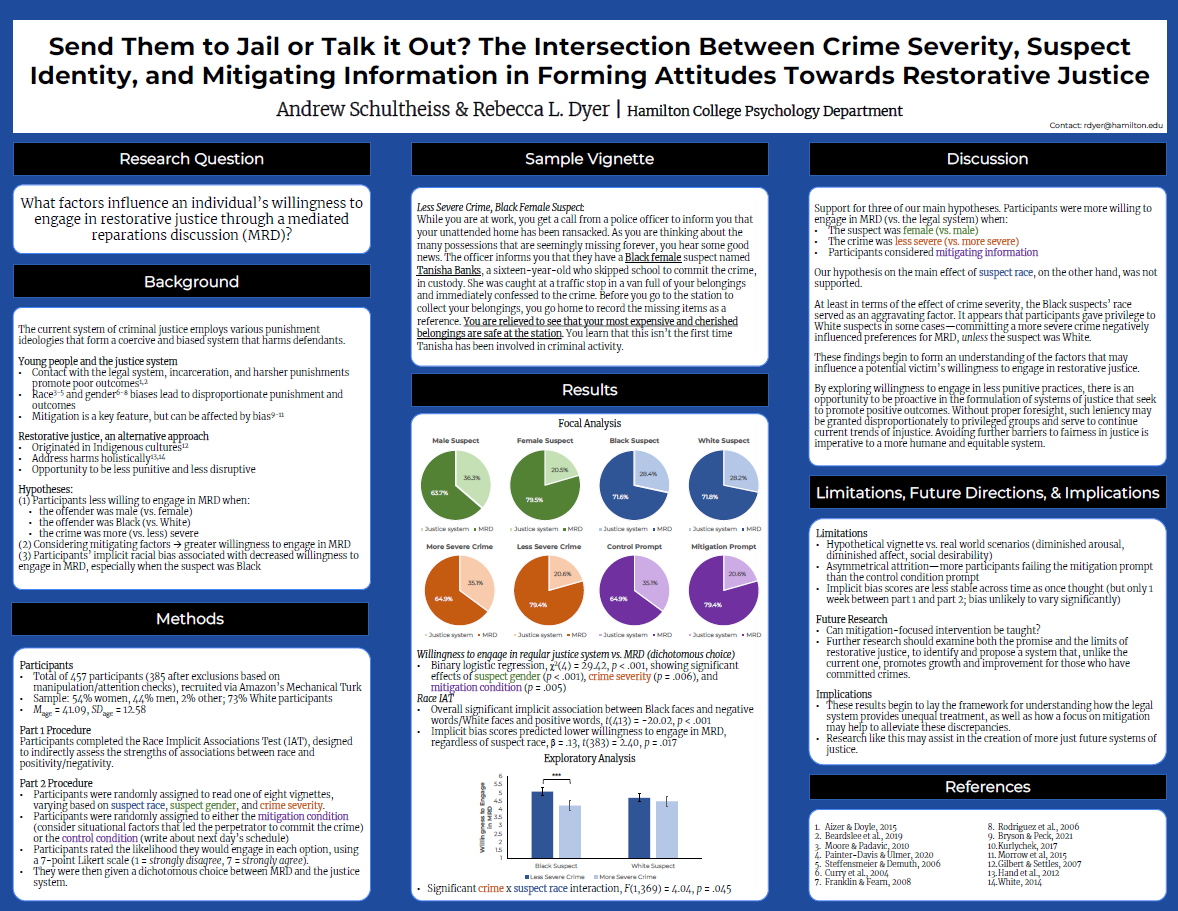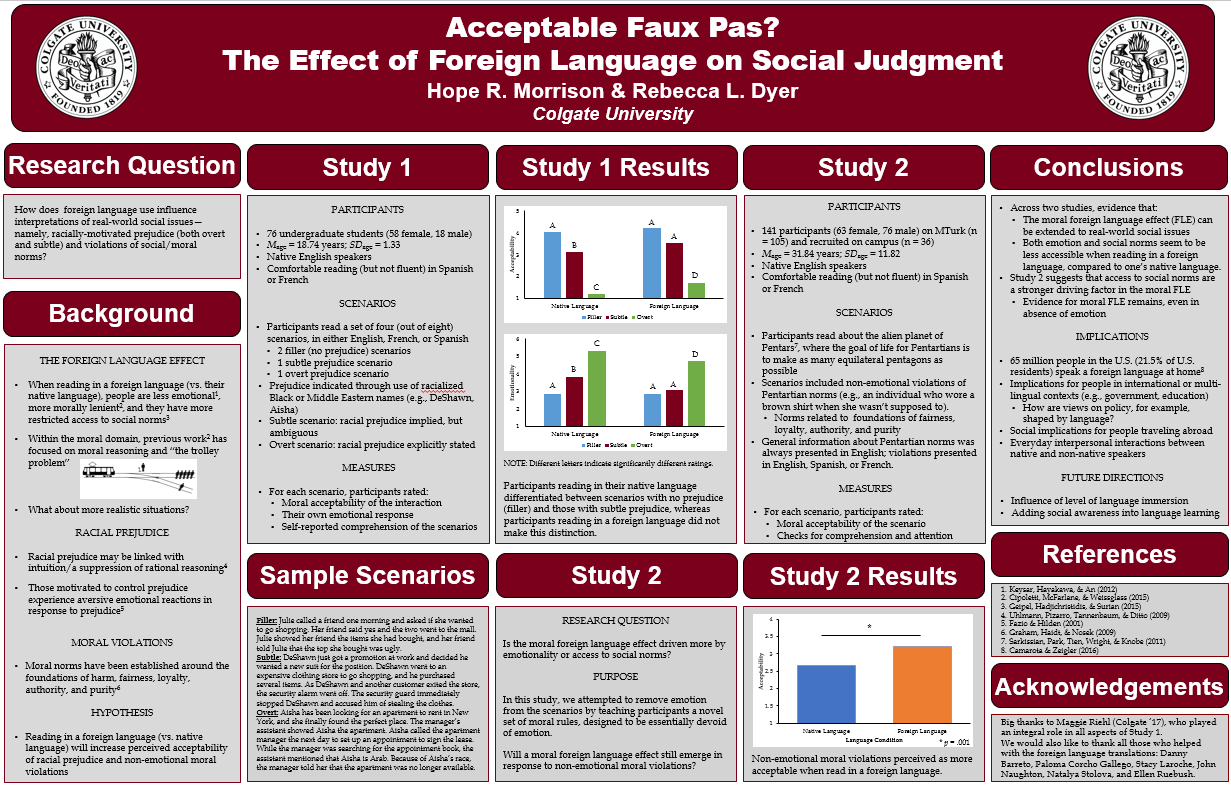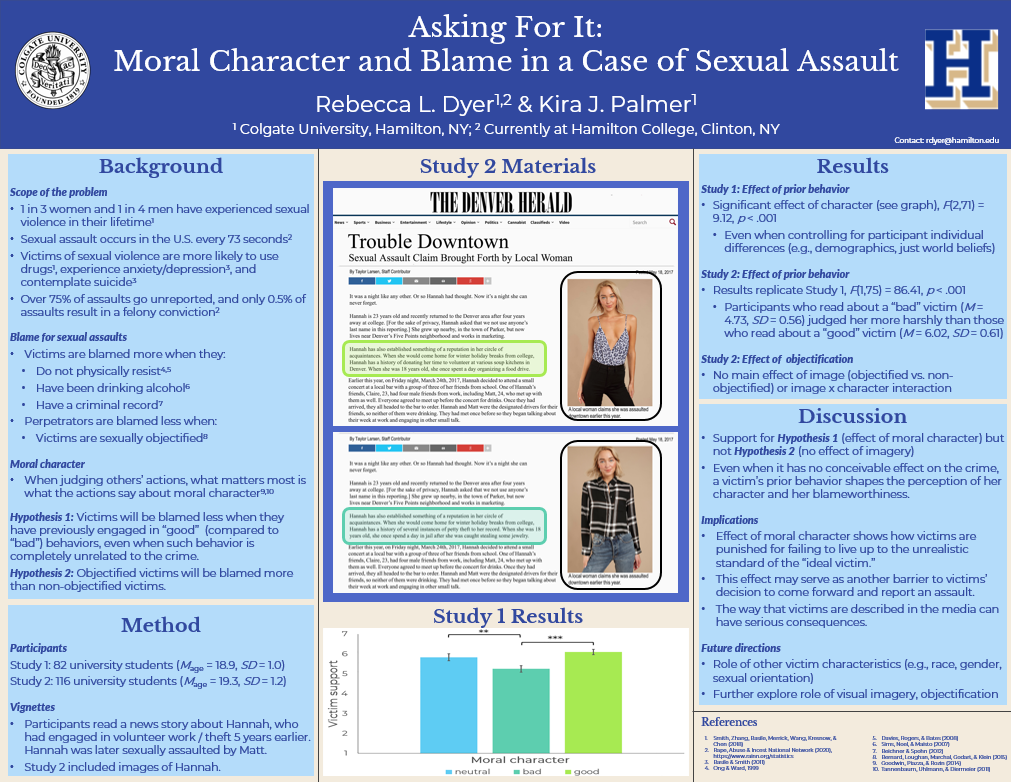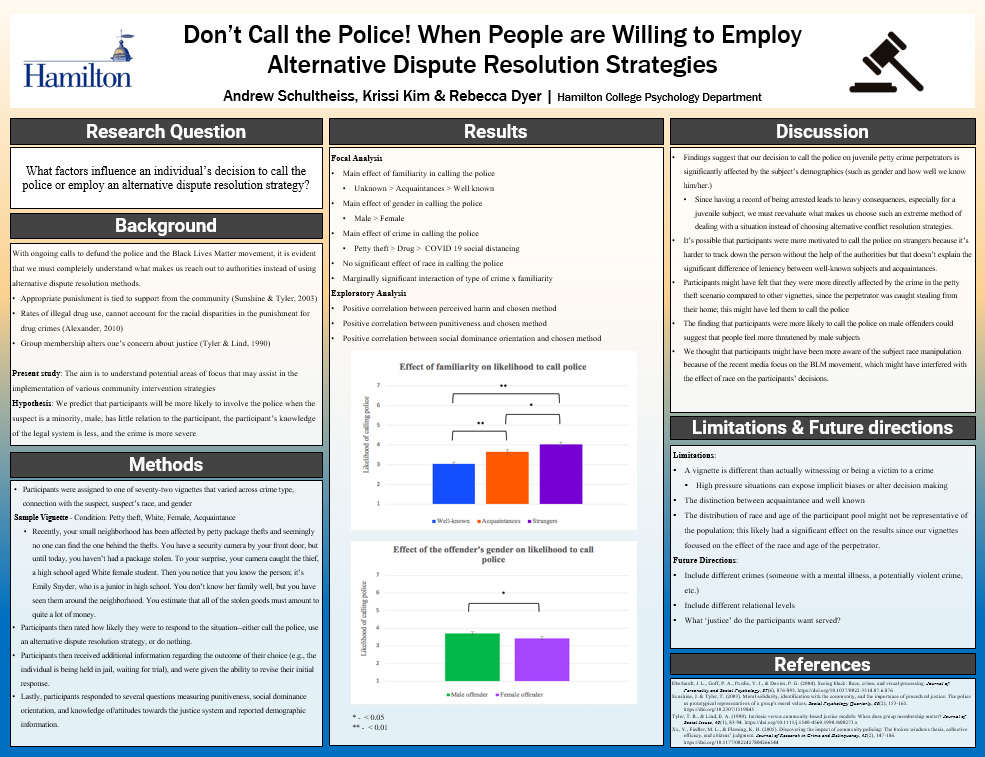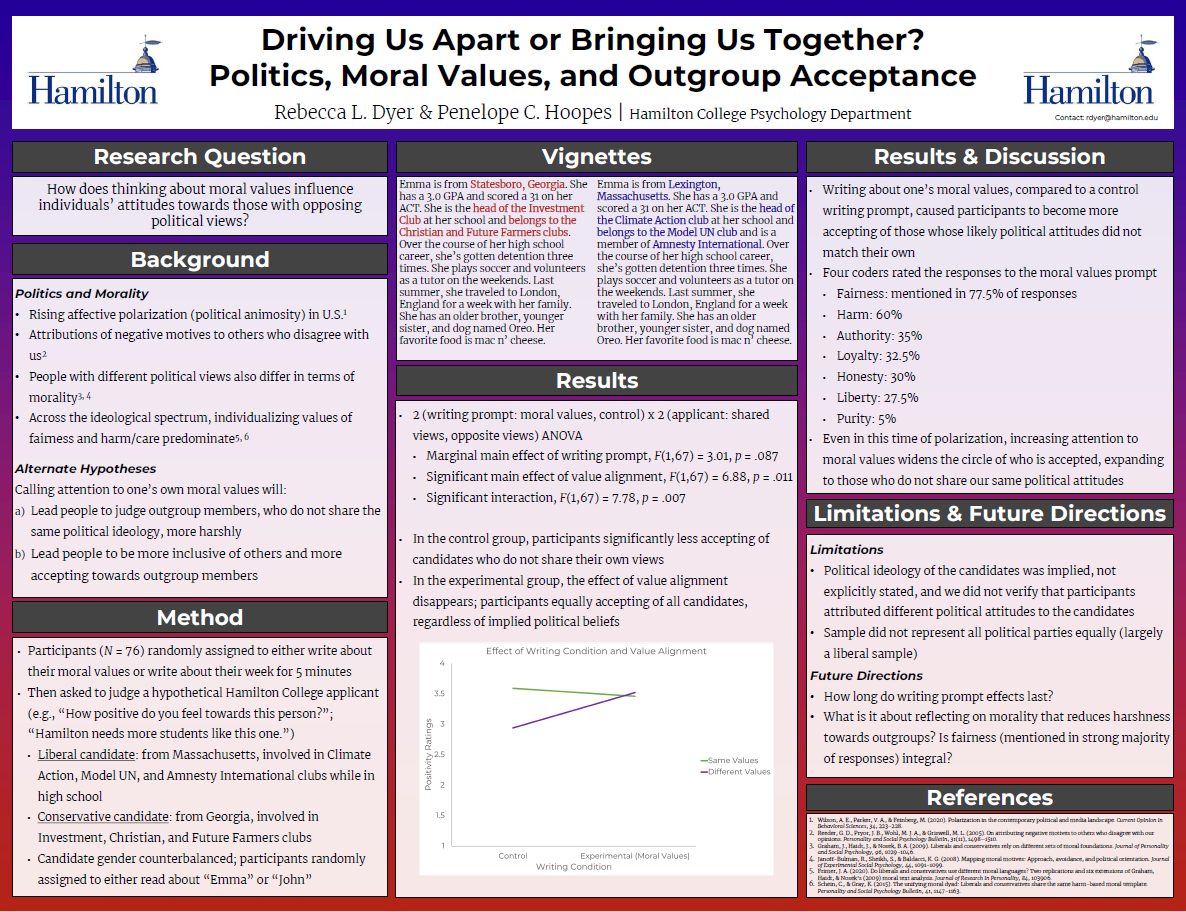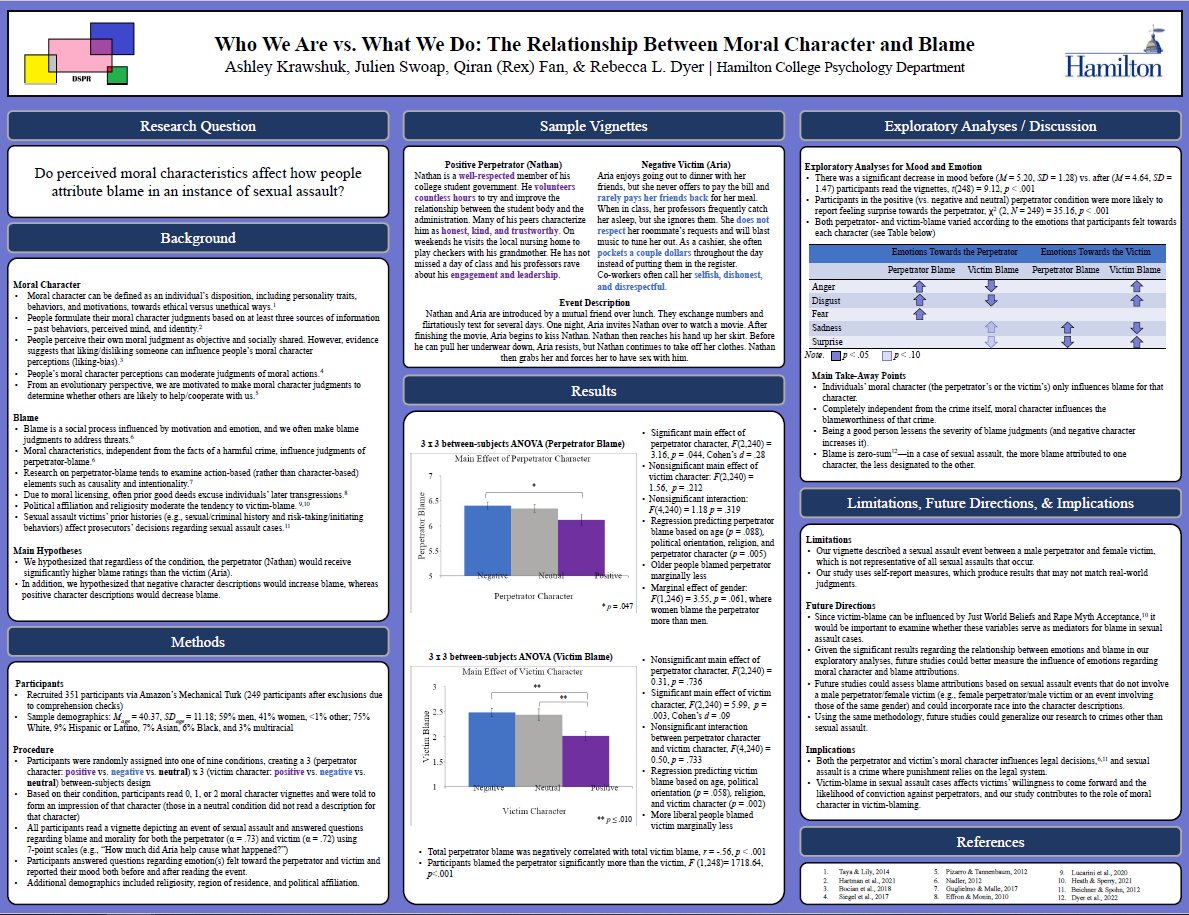
email contact
rdyer@hamilton.edu
Mailing Address
Hamilton Psychology Dept.
198 College Hill Rd.
Clinton, NY 13323
OFFICE
Taylor Science Center, 3034
Phone
(315) 859-4225
I am a social psychologist, specializing in moral psychology. My research examines the motivational, emotional, and cognitive mechanisms underlying moral judgment and behavior.
I am currently a Visiting Assistant Professor at Hamilton College. I regularly teach Introduction to Psychology, Research Design, The Science of Morality, Social Psychology, and Senior Projects.
I previously taught at Colgate University (2016-2019) and worked at Cornell University as a Postdoctoral Associate (2014-2016). I received my PhD from Yale University (2014) and my bachelor’s degree from Haverford College (2007).
Here are some other relevant places to find me:
My Google Scholar page
My ResearchGate profile
My academia.edu profile
RESEARCH
Motivation & Blame Attribution
Why do we blame victims?
In my primary line of my research, I investigate the relationship between victim blame and perpetrator blame, including how one affects the other. My research shows that when it comes to victims and perpetrators, blame is zero-sum; when victims are seen as having contributed to the crime against them, this actively takes away from blame for the perpetrator. This discounting of perpetrator blame occurs because the victim is perceived as more deserving of what happened to them. The zero-sum nature of blame can be seen in plenty of real-world examples, when the defense of a perpetrator seems to focus on what the victim should have done differently.
See: Dyer, R. L., Pizarro, D. A., & Ariely, D. (2022). They had it coming: The relationship between perpetrator-blame and victim-blame. Social Cognition, 40(6), 503-527. https://doi.org/10.1521/soco.2022.40.6.503
Moral Emotions & Moral Character
What is the role of affective reactions in blame judgments?
I am also interested in how blame for both victims and perpetrators is driven by factors other than the actions contributing directly to the crime. Namely, I study the ways in which blame is shaped by perceptions of moral character and people’s emotional reactions towards the targets of blame. The same behavior can be viewed quite differently depending on whether it was carried out by a “good” or “bad” person—importantly, both victims and perpetrators can be perceived as either one. Observers may also look to their own emotional reactions to help inform their moral judgments. Anger and disgust directed towards the perpetrator, for example, contribute to an increase in perpetrator blame and a decrease in victim blame, whereas those same emotions directed towards the victim contribute to an increase in victim blame.
See: Fan, Q., Swoap, J., Krawshuk, A., & Dyer, R. L. (2023, February). Who we are vs. what we do: The relationship between moral character and blame. Poster presented at the annual meeting of the Society for Personality and Social Psychology, Atlanta, GA. https://osf.io/y4sne
Cognition, Affect, & Norm Violations
How wrong is it to violate a moral norm?
I have also studied how people perceive violations of social/moral norms. From a cognitive framework, I have examined the moral foreign language effect (FLE): research has previously shown that when thinking/reading in a foreign (vs. native) language, people tend to be more morally lenient in their judgment of others. My research suggests that this moral FLE may occur because foreign language use inhibits cognitive access to social norms. From a more affective lens, my collaborators and I hypothesized that manipulating the personal relevance of a threat would influence the perceived immorality of that threat. Early evidence supports this hypothesis, with liberal participants finding a traditionally “conservative” norm violation (disrespecting an elder) more immoral after considering the personal relevance of such a violation.
See: Dyer, R. L., Herbst, N. R., Hintz, W., A., & Williams, K. E. G. (2023). Personal relevance affects the perceived immorality of politically-charged threats. PLoS One, 18(12), e0296177. https://doi.org/10.1371/journal.pone.0296177
Motivated Moral Reasoning
Why do good people do bad things?
In some of my early work for my doctoral dissertation, I explored the chronic motivation to justify one’s own morally questionable behavior. More recently, I have been continuing to investigate this idea. I am interested in the effect of abstract (vs. concrete) thinking on both the formation of good intentions and the justification of bad behaviors.
See: Dyer, R. L. (2014). From good intentions to bad behavior: The role of motivation in moral decision-making. Doctoral dissertation, Yale University.
Publications
Dyer, R. L., Herbst, N. R., Hintz, W., A., & Williams, K. E. G. (2023). Personal relevance affects the perceived immorality of politically-charged threats. PLoS One, 18(12), e0296177. https://doi.org/10.1371/journal.pone.0296177
Dyer, R. L., Pizarro, D. A., & Ariely, D. (2022). They had it coming: The interaction of perpetrator-blame and victim-blame. Social Cognition, 40(6), 503-527. https://doi.org/10.1521/soco.2022.40.6.503
Aragón, O. R., Clark, M. S., Dyer, R. L., & Bargh, J. A. (2015). Dimorphous expressions of positive emotion: Displays of both care and aggression in response to cute stimuli. Psychological Science, 26, 259-273. https://doi.org/10.1177/0956797614561044
Dyer, R. L. (2014). From good intentions to bad behavior: The role of motivation in moral decision-making. Doctoral dissertation, Yale University. [Link]
Norton, M. I., Mason, M. F., Vandello, J. A., Biga, A., & Dyer, R. (2013). An fMRI investigation of racial paralysis. Social Cognitive and Affective Neuroscience, 8, 387-393. https://doi.org/10.1093/scan/nss010
Bargh, J. A., Schwader, K. L., Hailey, S. E., Dyer, R. L., & Boothby, E. J. (2012). Automaticity in social-cognitive processes. Trends in Cognitive Sciences, 16, 593-605. https://doi.org/10.1016/j.tics.2012.10.002
Boltz, M., Dyer, R. L., & Miller, A. R. (2010). Are you lying to me? Temporal cues for deception. Journal of Language and Social Psychology, 29, 458-466. https://doi.org/10.1177/0261927X10385
Mason, M. F., Zhang, S., & Dyer, R. L. (2010). Male susceptibility to attentional capture by power cues. Journal of Experimental Social Psychology, 46, 482-485. https://doi.org/10.1016/j.jesp.2009.12.014
Mason, M. F., Dyer, R., & Norton, M. I. (2009). Neural mechanisms of social influence. Organizational Behavior and Human Decision Processes, 110, 152-159. https://doi.org/10.1016/j.obhdp.2009.04.001
Manuscripts currently in progress:
Dyer, R. L. & *Morrison, H. R. (under review). Acceptable faux pas? The effect of foreign language on social judgment.
*Schultheiss, A. & Dyer, R. L. (in revision for new submission). Send them to jail or talk it out? The intersection between crime severity, suspect identity, and mitigating context in forming attitudes towards restorative justice.
Dyer, R. L. & *Palmer, K. J. (in prep). Sins of the past: Moral character and blame in a case of sexual assault.
Dyer, R. L. & *Hoopes, P. (in prep). Driving us apart or bringing us together? Politics, moral values, and outgroup acceptance.
* Indicates undergraduate student co-author
Teaching
Teaching interests:
Moral Psychology
Social Psychology
Emotions
Social Cognition
Introduction to Psychology
Research Methods
Statistics
Teaching experience:
Visiting Assistant Professor (Hamilton College, 2019 to present)
Introduction to Psychology
Research Design
Science of Morality, Seminar and Lab
Senior Projects
Social Psychology
Visiting Assistant Professor (Colgate University, 2016 to 2019)
Advanced Social Psychology
Moral Psychology
Research Methods in Psychology
Senior Research
Social Psychology
Adjunct Professor (Quinnipiac University, Spring 2013)
Social Psychology
Teaching Fellow (Yale University, 2010 to 2012)
Research Methods (Professor: Woo-kyoung Ahn)*
Moralities of Everyday Life (Professor: Paul Bloom)*
The Modern Unconscious (Professor: John Bargh)
Introduction to Psychology (Professor: Paul Bloom)
* Included being in charge of at least one section outside the main class
Other teaching-related service/experience:
- Supervisor/mentor for senior psychology majors’ thesis projects (Hamilton College and Colgate University)
- Supervisor/mentor for undergraduate research assistants (Hamilton College, Cornell University, and Yale University)
- Science in the Classroom Author and Fellow: participant in the course, “Students Reading Real Science: Bringing Primary Literature into the Undergraduate Classroom,” which focused on making primary literature more accessible to an undergraduate audience (Cornell University and the American Association for the Advancement of Science).
- Published an annotated Science article (Wojcik et al., 2015), aimed towards undergraduate students
Select student comments from teaching evaluations:
“I think the reason I got so much out of this course and learned so much was because of Professor Dyer’s teaching style and passion.”
“Professor Dyer is incredibly invested in the success of me and my classmates. She worked tirelessly throughout the entire semester to help each and every student individually, and I have therefore become a better research paper writer and learned so much about the course in general.”
“I found this class to be a breath of fresh air that promoted student learning and initiative.”
“I have been in seminar classes before, but this class’s discussion exceeds all of my previous expectations for what a strong in-class discussion should look like.”
"Professor Dyer was a joy to work with on my senior research. She was always readily available to help out when needed, but also provided us with enough space to come to conclusions and decisions on our own."
“This course was very, very thought-provoking. Lecture was almost always entirely discussion-based which made it very easy to personally engage with course material and learn from Professor Dyer and my peers. Creative thought was very encouraged, [and I] definitely grew in my critical thinking and writing skills. The course was organized very well, such that all material was constantly growing on the foundation we had built in previous classes.”
“Professor Dyer was very interactive and communicative. She was always adding to our conversations in a thoughtful and productive way, and facilitated the class and discussions very well.”
“Professor Dyer is very responsive to questions, probes students to think deeper, and clearly loves psychology and helping her students.”
“This course has contributed to my intellectual growth and education more than any other class I took at Colgate. Professor Dyer did an excellent job at facilitating discussion and allowing for the topics to mold into discussions that were more prevalent and relevant."
“I thought that this course was really good at encouraging learning. The course was really well designed, with all the different research methods coming in a logical order that made it easier to comprehend and understand. I think that Professor Dyer promoted a really positive learning environment, and I think I learned a lot from this course.”
Students' work
supervised senior thesis research
Hamilton College
2023 — 2024
Investigating correlates of PTSD and depression after unwanted sexual contact: Victim-blame, self-blame, and rape myth acceptance
Is higher education liberal propaganda? The relationship between college major and political affiliation
“Put me in, coach!” How coaching style impacts performance outcomes
The influence of mental illness mitigating evidence in mock juror blame attribution and sentencing endorsements
Time flies when you’re with your pet? The role of pets in affective time estimation
2021 — 2022
Fraud and feelings: The effect of emotion on misinformation susceptibility
How the model minority myth hurts us all: Anti-Black attitudes and outgroup denigration
Psychopathy and physiological harm aversion
Putting the good in a good day’s work: Examining the relationship between happiness, sadness, and productivity
The tragedy of the (medical) commons: Prioritization and resource stewardship in the healthcare industry
Vicarious moral self-regulation in response to moral suasion and resistance to conformity pressures
2019 — 2020
Active engagement: Pretense play beyond childhood
But he is a good person: Perpetrator personality, moral judgments, and victim blaming
Burnt out but not beaten down: Promoting resilience in psychology graduate students
Driving us apart or bringing us together? Moral values, politics, and outgroup acceptance
In her shoes: The effect of perspective taking on reducing rape myth acceptance and the schema-driven processing of information about rape
2022 — 2023
A model like me: The effects of race-matched role models on student achievement
Body and mind: The cognitive, physiological, and social concepts related to exercise
Cross-cultural helping hands: The role of neural threat and reward systems in facilitating cooperation
Effects of social exclusion on just-world beliefs and victim blame, moderated by moral identity
Life history strategy, political ideology, and religiosity: The mediating role of moral intuition
The need for identity renegotiation after athletic retirement
2020 — 2021
I won’t buy it! Connecting consumer anger and moral licensing to boycott decisions
Send them to jail or talk it out? A look into willingness to engage in restorative justice
The effects of white guilt on punishment: A moral cleansing approach
Waste not, cheat not: The effects of resource availability on cheater detection
Why did she struggle? Gender salience and stereotypicality in the ultimate attribution error
Who gets the toilet paper? The effect of perceived risk on inequity aversion
Colgate University
2018 — 2019
Company vs. CEO: The effect of corporate social responsibility and CEO behavior on consumer attitudes
Is it okay for them to do that? Perceiving immoral behavior in other cultures
Surveying the experiences of students of color at primarily-white institutions
The idea victim: The role of moral character in perceptions of victim-blame
2016 — 2017
Acceptable faux pas: The effect of foreign language on social judgment
The effect of individual & social guilt on decision-making
The effect of stereotypical symbols on attitudes towards others
2017 — 2018
Effects of media modality on consumer and environmental behavior
How do you see me? A study on language and perceptions of others
The decoy effect and time pressure on consumer decision-making
The role of affiliation in the motivation to blame others
Supervised Summer Research
Summer 2022 (Hamilton College)
Who we are vs. what we do: The relationship between moral character and blame
Summer 2020 (Hamilton College)
Don’t call the police! When people are willing to employ alternative dispute resolution strategies
The influence of corporate and CEO reputation on consumer attitudes
Summer 2017 (Colgate University)
Temperature priming and the prisoner's dilemma
In The News
Coverage based on: Dyer, Herbst, Hintz, & Williams (2023)
Click the headline to link to the article.
Coverage based on: Krawshuk, Swoap, Fan, & Dyer (2022)
Select coverage based on: Aragón, Clark, Dyer, & Bargh (2015)
Select coverage based on: Dyer, Aragón, Piasio, Clark, & Bargh (2013, January):
Coverage based on: Boltz, Dyer, & Miller (2010):







